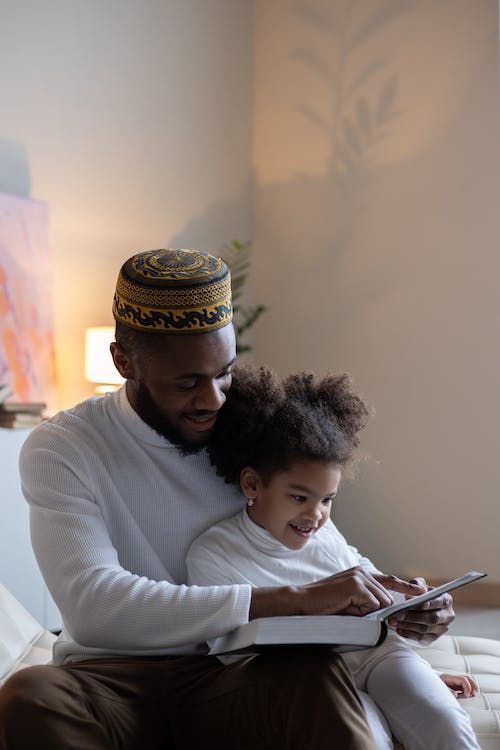Raising Muslim children in a non-Muslim environment, especially in Western societies, presents unique challenges. These challenges stem from cultural, social, and religious differences that can cause confusion and pressure for both parents and children. Below is a detailed exploration of these challenges and practical solutions to address them.
- Religious and Cultural Identity
One of the biggest challenges is maintaining a strong Islamic identity in a predominantly non-Muslim environment. Children may feel the need to fit in with their peers, but at the same time, they don’t want to abandon their faith and cultural values. This can lead to an identity crisis, where they feel torn between their home life and their public life.
Solutions:
Strengthening Islamic Identity at Home: Make sure that the home environment reinforces Islamic values naturally. Teach Islam in a way that is engaging and enjoyable, rather than imposing it strictly. Use family activities such as reading Islamic stories, holding Quranic study circles, and explaining the beauty of Islamic teachings.
Ongoing Conversations About Identity: Engage in open discussions with your children about their identity. Listen to their experiences and struggles, and help them understand that being different is not a negative thing but part of human diversity. Teach them that having multiple identities (being both Muslim and a part of the larger society) is not a contradiction, but rather a source of strength.

2. Influence of Media and Dominant Culture
Western media, including television, the internet, and social media, has a significant impact on children’s minds. The cultural messages conveyed through these platforms often conflict with Islamic values, especially in areas related to morality, social behavior, and lifestyle choices.
Solutions:
Monitor and Guide Media Consumption: It’s important to monitor what your children watch, not by completely banning certain content, but by guiding them toward media that aligns with Islamic values or is at least neutral. Select educational programs, films, and platforms that foster positive messages. Instead of just forbidding inappropriate content, use it as an opportunity to discuss why it conflicts with Islamic values.
Open Discussions About Media: Use what they watch as a starting point for meaningful discussions about Islamic values. Help them develop critical thinking skills, so they can independently assess whether the content they’re exposed to is aligned with their beliefs.
- Social Interaction and Peer Pressure
Children in the West are often surrounded by peers from diverse cultures and religions, which may encourage them to participate in activities that conflict with their faith, such as parties where alcohol is served or activities like dancing and dating.

Solutions:
Teaching Respectful Decline: Children should learn how to politely decline participating in activities that contradict their religious beliefs without feeling embarrassed or isolated. Teach them to have the confidence to say “no” when it comes to things that are against their values.
Encouraging Positive Friendships: Encourage your children to build friendships with peers who share similar values and principles. This can be through joining Islamic youth groups or engaging in social activities that align with Islamic teachings, such as sports or volunteering.
- Celebrating Islamic Festivals and Holidays
Islamic holidays like Eid al-Fitr and Eid al-Adha are not widely recognized in the West, and children may feel left out when they see their peers celebrating Christmas, Halloween, or other national holidays.
Solutions:
Create Special Celebrations at Home: Ensure that Islamic holidays are celebrated in a meaningful way at home. Decorate the house, prepare special meals, and give gifts to make the occasion joyful. You can also invite non-Muslim friends and neighbors to join, helping to spread awareness about these important occasions.
Celebrating Global Holidays in a Balanced Way: If children feel drawn to participate in non-Islamic holidays like Christmas or Halloween, guide them in how to engage in a way that respects their faith, such as participating in the cultural aspects without compromising their beliefs.

- Facing Discrimination and Prejudice
Sadly, discrimination against Muslims is a reality in some Western communities. Children may face prejudice at school or in public, which can be hurtful and demoralizing.
Solutions:
Teaching How to Respond to Discrimination: Prepare your children to face discrimination calmly and assertively. Teach them to respond with dignity and respect when they encounter prejudice. If discrimination happens at school, it’s essential to communicate with teachers and administrators to ensure appropriate action is taken.
Building Confidence: Strengthen your children’s self-esteem by instilling pride in their Muslim identity. Help them understand that Islam is a respected, global religion, and they have every right to practice their faith with confidence.

- Different Dress Codes and Cultural Practices
Islamic dress, such as the hijab for girls, may be met with curiosity or even ridicule in Western schools. Children may feel uncomfortable or face bullying because of their appearance.
Solutions:
Highlight the Significance of Islamic Dress: Make sure that your children understand the spiritual and personal reasons behind wearing the hijab or modest clothing. Encourage them to feel proud of their choice and help them see it as a reflection of their commitment to their faith.
Teaching How to Handle Criticism: If children are bullied or criticized for their Islamic dress, teach them how to respond gracefully. They should feel empowered to explain the meaning behind their dress in a respectful and confident manner.

- Challenges in School and Education
Schools in the West often don’t provide space for religious practices, such as daily prayers or fasting during Ramadan. Additionally, the curriculum might include subjects that conflict with Islamic values, such as sex education or participation in non-Islamic celebrations.
Solutions:
Engage With the School: Keep open lines of communication with your child’s school to explain their religious needs, such as finding time and space for prayer or accommodations during fasting in Ramadan. Schools are often willing to cooperate if approached respectfully.
Preparing Children for Challenging Situations: Teach your children how to ask for exemptions from certain activities that conflict with their faith, such as participating in celebrations or lessons that go against Islamic principles.

- Social Isolation
Sometimes, Muslim children may feel socially isolated because they don’t participate in activities that their non-Muslim peers enjoy, such as mixed-gender parties or events involving alcohol.
Solutions:
Organize Social Events: Instead of allowing them to feel left out, arrange alternative social gatherings that align with Islamic values, such as family outings or Islamic youth group activities where they can bond with other Muslim children.
Teach Them How to Explain Their Choices: It’s essential for children to know how to explain their decisions to their friends in a way that’s respectful and clear. This can help prevent feelings of isolation and encourage their peers to respect their choices.

- Fasting in a Non-Muslim Environment
Fasting during Ramadan can be a significant challenge for children, especially when it’s not understood or supported by the community around them. They may feel tired, hungry, or face questions from classmates about why they are not eating.
Solutions:
Prepare Children Physically and Mentally: Gradually prepare your children for fasting by starting them off with shorter fasts before Ramadan. Teach them to manage their energy during the school day and discuss the spiritual benefits of fasting.

Communicate With the School: Let the school know that your child is fasting and may need certain accommodations, such as not participating in strenuous activities or having a quiet place to rest during lunchtime.
- Daily Religious Practices
Performing daily religious practices, like praying or reading the Quran, in a Western school or public environment may be challenging. Children might feel embarrassed or unsure about how to balance their religious obligations with their daily schedule.
Solutions:
Finding Safe Spaces for Prayer: Help your children find appropriate places for prayer, whether at school or in public. Institutions are often understanding when approached with clear, respectful requests.
Teach the Importance of Religious Obligations: Emphasize that practicing their religion is a fundamental part of their identity. Children should understand that their faith is not something to hide or feel ashamed of, but rather a source of strength.

Conclusion:
Raising Muslim children in the West requires flexibility, understanding, and open communication. With love, guidance, and support, parents can help their children navigate these challenges while maintaining their Islamic identity. Encouraging open dialogue and understanding, along with positive engagement in the community, can help children grow into confident and well-rounded individuals.
